|
|
|
Sort Order |
|
|
|
Items / Page
|
|
|
|
|
|
|
| Srl | Item |
| 1 |
ID:
091321


|
|
|
|
|
| Publication |
Stockholm, SIPRI, 2009.
|
| Description |
iv, 62p.
|
| Series |
SIPRI policy paper no 24
|
| Standard Number |
9789185114603
|
|
|
|
|
|
|
|
|
|
|
|
Copies: C:1/I:0,R:0,Q:0
Circulation
| Accession# | Call# | Current Location | Status | Policy | Location |
| 054428 | 387.7/GRI 054428 | Main | On Shelf | General | |
|
|
|
|
| 2 |
ID:
079728
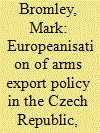

|
|
|
|
|
| Publication |
2007.
|
| Summary/Abstract |
This article examines changes in the level of transparency and the outcomes of arms export policies in the Czech Republic, Poland, and Slovakia since they joined the EU in May 2004, and determines the extent to which these changes are attributable to the 'Europeanisation' of this policy area. Following the approach of the existing literature, this article views the Europeanisation of EU arms export policy as the process by which certain key policy structures and decision-making processes become increasingly subject to systems of multi-level governance. The article finds that while Europeanisation has led to an increase in arms export policy transparency, its impact on arms export policy outcomes is harder to detect. At most, Europeanisation has been one of a range of factors driving change in this area
|
|
|
|
|
|
|
|
|
|
|
|
|
|
|
|
| 3 |
ID:
085736


|
|
|
|
|
| Publication |
Sweden, SIPRI, 2008.
|
| Description |
57p.
|
| Series |
SIPRI policy paper; no. 21
|
|
|
|
|
|
|
|
|
|
|
|
Copies: C:1/I:0,R:0,Q:0
Circulation
| Accession# | Call# | Current Location | Status | Policy | Location |
| 054091 | 382.9142/BRO 054091 | Main | On Shelf | General | |
|
|
|
|
| 4 |
ID:
107779
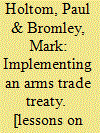

|
|
|
|
|
| Publication |
Sweden, SIPRI, 2011.
|
| Description |
vii, 42p.
|
| Series |
SIPRI policy paper no. 28
|
| Standard Number |
9789185114658
|
|
|
|
|
|
|
|
|
|
|
|
Copies: C:1/I:0,R:0,Q:0
Circulation
| Accession# | Call# | Current Location | Status | Policy | Location |
| 056280 | 382.456234/HOL 056280 | Main | On Shelf | General | |
|
|
|
|
| 5 |
ID:
097187
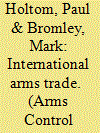

|
|
|
| 6 |
ID:
121703
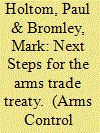

|
|
|
|
|
| Publication |
2013.
|
| Summary/Abstract |
On April 2, the UN General Assembly adopted the text of the Arms Trade Treaty (ATT) by a vote of 156-3, with 22 abstentions.[1] After the treaty is opened for signature early this month, countries will sign it and prepare for its ratification according to their national procedures for considering treaties. The ATT requires ratification by 50 states before it can enter into force.
|
|
|
|
|
|
|
|
|
|
|
|
|
|
|
|
| 7 |
ID:
112223
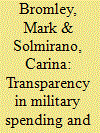

|
|
|
|
|
| Publication |
Sweden, SIPRI, 2012.
|
| Description |
vii, 48p.
|
| Series |
SIPRI Policy Paper No.31
|
| Standard Number |
9789185114702
|
|
|
|
|
|
|
|
|
|
|
|
Copies: C:1/I:0,R:0,Q:0
Circulation
| Accession# | Call# | Current Location | Status | Policy | Location |
| 056468 | 327.18/BRO 056468 | Main | On Shelf | General | |
|
|
|
|
| 8 |
ID:
115280
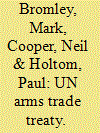

|
|
|
|
|
| Publication |
2012.
|
| Summary/Abstract |
The UN conference to negotiate an Arms Trade Treaty (ATT) concluded on 27 July 2012 without reaching consensus on the text of a draft treaty and saw both the US and Russia calling for more time to negotiate. The ATT process marks the latest in a series of attempts to insert human security concerns into arms export controls. The setback in July raises questions about the current level of international support for the human security agenda, as well as the relative power of different actors to shape global governance structures. This article locates the ATT negotiations in the broader history of multilateral efforts to regulate the international arms trade, from the 1890 Brussels Act to post-Cold War initiatives. The historical record shows that such efforts are more likely to succeed if they are negotiated or imposed by major arms exporters. The introduction of human security concerns, as well as the merging of export control and arms control agendas, went some way towards reversing this trend. In particular, it created a broad international coalition of supportive states and NGOs from the global North and South. Yet disagreements over the purpose of an ATT remained. The draft ATT included human security provisions, but China, Russia, the US and a number of emerging powers ensured that state security considerations remained paramount in decision-making on arms exports. The US was the first major actor to announce its unwillingness to sign the draft ATT in July 2012 and two alternative interpretations of US actions are considered. The article concludes by considering the options available to supporters of the ATT process following the 2012 conference and examines the notion that the ATT campaign has become an initiative 'out of its time', one that might have had success in the 1990s but not in current circumstances.
|
|
|
|
|
|
|
|
|
|
|
|
|
|
|
|
|
|
|
|
|